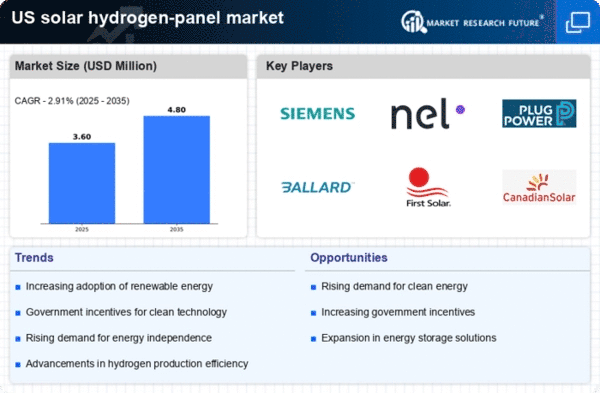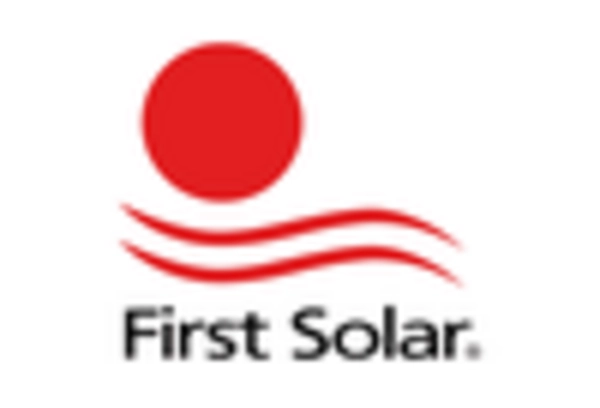Rising Energy Demand
The increasing energy demand in the US is a pivotal driver for the solar hydrogen-panel market. As the population grows and industrial activities expand, the need for sustainable energy sources intensifies. The US Energy Information Administration (EIA) projects that energy consumption will rise by approximately 10% by 2030. This surge necessitates innovative solutions, such as solar hydrogen panels, which can efficiently convert solar energy into hydrogen fuel. The solar hydrogen-panel market is positioned to meet this demand, providing a clean alternative to fossil fuels. Furthermore, the integration of hydrogen as an energy carrier is gaining traction, potentially leading to a market value exceeding $100 billion by 2030. This trend indicates a robust opportunity for growth within the solar hydrogen-panel market, as stakeholders seek to capitalize on the shift towards renewable energy solutions.
Environmental Regulations
Stringent environmental regulations in the US are significantly influencing the solar hydrogen-panel market. The federal and state governments are implementing policies aimed at reducing greenhouse gas emissions and promoting cleaner energy sources. The Environmental Protection Agency (EPA) has set ambitious targets for emissions reductions, which are likely to drive investments in renewable technologies. As a result, The solar hydrogen-panel market is expected to benefit from increased adoption. These panels offer a sustainable solution to meet regulatory requirements. The market could see a compound annual growth rate (CAGR) of around 15% over the next five years, driven by the need for compliance with these regulations. This regulatory landscape not only encourages innovation but also fosters a competitive environment for solar hydrogen technologies, positioning them as viable alternatives in the energy sector.
Technological Innovations
Technological innovations are reshaping the solar hydrogen-panel market, enhancing efficiency and reducing costs. Advances in photovoltaic materials and hydrogen production methods are making solar hydrogen panels more accessible and effective. For instance, the development of bifacial solar panels, which capture sunlight from both sides, has shown potential to increase energy output by up to 20%. Additionally, improvements in electrolysis technology are enabling more efficient hydrogen production, further driving the market's growth. The US Department of Energy (DOE) has invested heavily in research and development, aiming to lower the cost of hydrogen production to below $2 per kg by 2030. Such innovations not only improve the economic viability of solar hydrogen panels but also contribute to their adoption across various sectors, including transportation and industrial applications.
Investment in Renewable Energy
The surge in investment in renewable energy is a crucial driver for the solar hydrogen-panel market. In recent years, the US has witnessed a significant influx of capital directed towards clean energy projects. According to the Solar Energy Industries Association (SEIA), investments in solar energy have reached over $18 billion annually. This financial commitment is likely to bolster the solar hydrogen-panel market, as investors seek to diversify their portfolios with sustainable technologies. Furthermore, the Biden administration's commitment to achieving a carbon-free power sector by 2035 is expected to catalyze further investments in hydrogen technologies. As a result, the solar hydrogen-panel market may experience accelerated growth, with projections indicating a potential market size of $50 billion by 2030, driven by increased funding and strategic partnerships.
Public Awareness and Acceptance
Public awareness and acceptance of renewable energy solutions are increasingly driving the solar hydrogen-panel market. As climate change concerns grow, consumers are becoming more informed about the benefits of sustainable energy sources. Surveys indicate that over 70% of Americans support the transition to renewable energy, which is likely to influence market dynamics. This heightened awareness is prompting both residential and commercial sectors to explore solar hydrogen panels as viable energy solutions. Additionally, educational campaigns and community initiatives are fostering a culture of sustainability, further enhancing the market's appeal. The solar hydrogen-panel market stands to gain from this shift in public perception, as more individuals and businesses seek to adopt clean energy technologies. This trend may lead to a market expansion, with projections suggesting a growth rate of approximately 12% annually over the next decade.

















